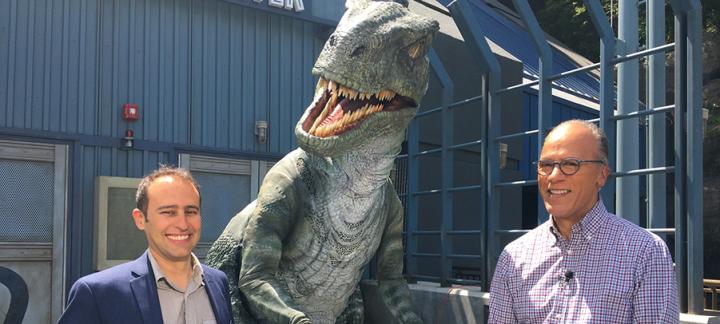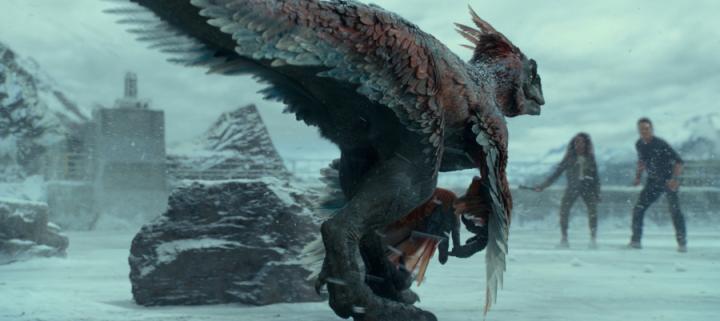Dinosaurs
Professor Steve Brusatte is an advisor for the upcoming film 'Jurassic World: Dominion' and has consulted for various programmes, including the BBC's 'Walking With Dinosaurs' and National Geographic's 'T.rex Autopsy'.

Professor Steve Brusatte is considered one of the finest dinosaur experts of his generation. He is a vertebrate palaeontologist and evolutionary biologist who specialises in the anatomy, genealogy, and evolution of dinosaurs and other fossil organisms.
He has written more than 110 scientific papers and described 16 new species of fossil animals. Most recently, he led a team that discovered the largest-known pterosaur from the Jurassic period. The giant winged creature – found on the Isle of Skye – lived around 170 million years ago and had an estimated wingspan of more than 2.5 metres.
Alongside his academic work, Brusatte has consulted on numerous films and documentary series and is an accomplished science writer, authoring several books including the New York Times bestseller, The Rise and Fall of the Dinosaurs: A New History of a Lost World.
His fieldwork has taken him around the world, including Brazil, Britain, China, Lithuania, Poland, Portugal, Romania, and the United States.
Steve is enthusiastic about scientific outreach and communicating his research to the public. He appears on television and radio and gives talks to museum, school, academic and public audiences.
Highlights
Steve regularly consults for numerous television programs and films. We have provided some highlights below.

Following the publication of his best-selling book 'The Rise and Fall of the Dinosaurs' Professor Steve Brusatte was approached to be the 'Paleontology Consultant' for the Jurassic Park movie franchise.
He became chief science advisor for the film 'Jurassic World: Dominion' released in June 2022.
Jurassic World Dominion propels the more than $5 billion franchise into daring, uncharted territory, featuring never-seen dinosaurs, breakneck action and astonishing new visual effects.
Now, some 30 years after Jurassic Park first wowed audiences, Steve is helping to bring dinosaurs to life all over again for a new generation.
The new feature film will introduce new species of dinosaurs and use innovative technology that allows the production to include more animatronic dinosaurs and practical effects than the two previous films.
Professor Brusatte has been working with Director and Producer Colin Trevorrow and Production Designer Kevin Jenkins, using his research on dinosaur anatomy to ensure that the dinosaurs are as realistic as possible within the constraints of a blockbuster film franchise.
And this time? Feathers are kind of a big deal! The first feathered dinosaurs weren’t discovered until 1996 – three years after Jurassic Park came out. To his credit, Treverrow made clear to Brusatte from the outset that he wanted to pay closer attention to the science, to make the dinosaurs more accurate and realistic. And he wanted to put feathers on some of them.
You can read more about Steve's experiences making a blockbuster film, plus exciting new discoveries including the largest-known pterosaur from the Jurassic period.
Edinburgh Impact story: King of the dinosaurs
Visit the official website for Jurassic World, with trailers, movie details and more:
Professor Brusatte was the resident palaeontologist and scientific consultant for the 2013 BBC Earth film 'Walking With Dinosaurs'. A family film about dinosaurs set in the Late Cretaceous period, it was titled after the BBC's 1999 television documentary miniseries of the same name. The film, with a budget of US$80 million, was one of the largest independent productions at the time.
You can watch the trailer here:
BBC Earth
Professor Brusatte also presented various online videos through the BBC and a 30-minute program, "Decade of Discovery", on the great advances in dinosaur palaeontology during the 2000s.
Here are a few highlights:
Top Ten Dino and Fossil Discoveries
Real-life dinosaur hunter: Steve Brusatte
Professor Brusatte was an on-screen presenter and consultant for the National Geographic Channel Program 'T. rex Autopsy', which teaches us about the biology and evolution of T. rex. The program used the novel concept of building a life-sized, scientifically accurate T. rex model including skin, feathers, muscles, bones, and internal organs, then dissecting it on screen.
Professor Brusatte's research on tyrannosaurs, particularly on their skeletal anatomy and large brains and keen senses, was instrumental in building the model and articulated through his presenter role.
This innovative show was broadcast worldwide to over 140 countries by the National Geographic Channel.
Watch 'The Gross Stuff: Behind the Scenes' video:
You can learn more and watch additional videos on the National Geographic website:
Professor Brusatte was the chief consultant for the 10-part children's CBBC series 'Deadly Dinosaurs with Steve Backshall'.
His research on tyrannosaurs and feathered dinosaurs were used to ensure the accuracy of animations and the appropriate use of hands-on experiments to explain aspects of dinosaur evolution, such as the strong bite force of the T. rex.
The series was nominated for a BAFTA.
You can watch the episodes through the BBC iPlayer
'The Day the Dinosaurs Died' documentary investigates the greatest vanishing act in our planet's history - the sudden disappearance of the dinosaurs 66 million years ago.
Professor Brusatte features in this documentary and was filmed excavating fossils in New Mexico. He discussed his research that showed that the dinosaurs went extinct abruptly and were rapidly replaced by mammals.
Over three million people watched the program on BBC2 in the UK, and it was among the top 120 watched documentaries on British television in 2017. It was later broadcast as a NOVA special on PBS in the USA and translated into several languages.
You can watch the preview here:
|
You can watch the documentary on the BBC iPlayer. |
You can also download the documentary through the NOVA website. |
You might know dinosaurs, but do you know dinosaurs...in the dark?
Dr Steve Brusatte was put through his palaeontology paces with the fiendishly difficult DINOSAUR IN THE DARK challenge!
Will he guess all of the dinosaurs correctly? Have a look!
The University of Edinburgh produced this fun challenge as part of the Edinburgh Science Festival.
Want to know more?
Find out more about Professor Steve Brusatte:
View Professor Brusatte's full research profile |
'The Rise and Fall of the Dinosaurs' |
Filmography profile on IMDb |
Study a Master of Research (MScR) Palaeontology and Geobiology
We are one of the leading centres of palaeontology and geobiology research in the UK and globally. Our MScR degree is the only such programme in palaeontology and geobiology in the UK.
Detailed information about the degree is available through our University Degree Finder:
Master of Research (MScR) Palaeontology and Geobiology
Earth and Planetary Sciences Institute
Discover more of our research activities in the Earth and Planetary Sciences Institute
Earth and Planetary Sciences Institute

